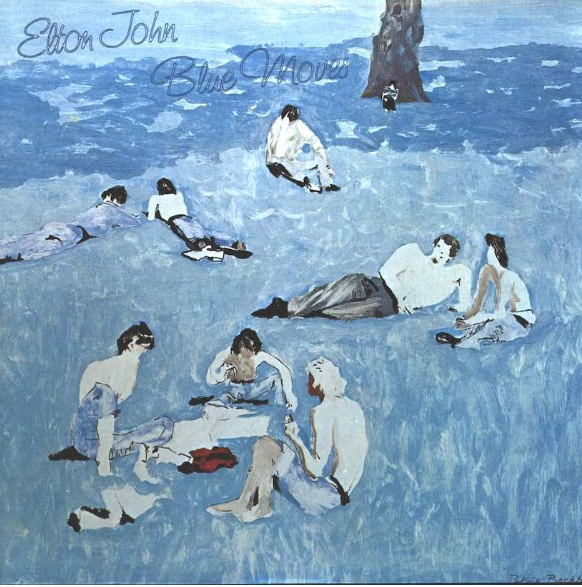May 4, 2024 | David Sigler
ELTON JOHN | BLUE MOVES | 1976



Blue Moves has the distinction of being Elton John’s second double album in less than three years, with a color also in the title (the first being John’s 1973 magnum opus Goodbye Yellow Brick Road). That sweeping landmark album is full of rich character driven lyrics by Bernie Taupin, the original classic band line up and immaculate production and arrangements by Gus Dudgeon. Blue Moves on the other hand (with lyrics by Taupin and producer Dudgeon once again), is completely different in terms of sound, approach and lyrical themes.
It should be pointed out that for the second album in a row, long time stalwarts Davey Johnstone (guitars) and Ray Cooper (percussion) are joined by incredible musicians like Roger Pope (drums), Kenny Passarelli (bass), Caleb Quaye (guitars) and keyboard wizard James Newton-Howard. This line up brings a sophisticated and accomplished sound to Blue Moves, compared to their debut just a year earlier with Rock Of The Westies, a much more looser and rockier effort.
Yet, despite the genuinely good musicianship executed by everyone involved, on Blue Moves John was starting to show signs of fatigue after five years of trailblazing success. Maybe it was that the times were changing, and John sometimes sounds weary over themes of loneliness, despair and broken relationships. Or maybe it’s the lyrics by Taupin, who was dealing with his own personal demons at the time and guided John into darker territory. Or heck, maybe it’s a combination of both. Regardless of the reason, it’s not that Blue Moves isn’t a solid listen but rather, the individual parts are better (and stronger) than the whole.
You can always count on John to deliver some strong ballads and Blue Moves has its full share. Clocking in at nearly 8 minutes, Tonight (with a stunning orchestral arrangement by Newton-Howard) is simply one of his best. Tonight describes in great detail the sense of impending doom of a relationship that appears to be vanishing: “I see the storm approaching / Long before the rain starts falling.“ Moreover, he pleads to find a way to make it work: “I’d like to find a compromise / And place it in your hands.” Startling stuff and one of John’s best falsettos ever put on record. On Chameleon (with great backing vocals by Toni Tennille among others and fine vocal by John), the narrative teeters back and forth between lust and trust: “Oh, Chameleon, you’re stealing your way back into my eyes / Beyond a shadow of a doubt / You’re a devil, you’re a devil in disguise.” The funky fade out really showcases Pope and Passarelli as well – a gem. Suicide is the theme of the emotive Someone’s Final Song while Cage The Songbird (including wonderful background vocals courtesy of Graham Nash and David Crosby), is a touching tribute to French singer Edith Piaf who died in 1963 at the young age of 47.
The Wide-Eyed and Laughing features a rare appearance of a sitar (on a John record at least) and reminds me a little of The Beatle’s Within You Without You. Here, Taupin offers up his most positive lyric: “And the hearts that I played on the porch swing for you / Was a song I’d heard in the past / “For I had an audience somewhere inside you / That applauded whenever you laughed.” John is joined by Nash and Crosby again (they really do sound great together), making Laughing the albums most unexpected turn.
Faith is explored on the searching tender hymn like Where’s The Shoorah?, and forgiveness is the subject of the classic Sorry Seems To Be The Hardest Word. With lead vibraphone playing by Cooper, a subtle orchestra arrangement by Newton-Howard and strong lead and backing vocals by John only, Sorry is a classic in every sense of the word.
As for the upbeat numbers, they fare pretty well on Blue Moves. One Horse Town, the best of them, forces John to string a whole lotta words together on the verses: “It sure is hell living in a one horse town / There’s half a mile of Alabama mud bed ground / Nothing much doing of an afternoon / Unless you’re sitting in a rocking chair just picking a tune.” Coming in at nearly six minutes, John doesn’t sing until almost two minutes in, as the song slowly builds and builds. A soaring string arrangement by Paul Buckmaster and a thumping heavy bassline by Passarelli, make One Horse Town the song that should have kicked off the album proper.
Crazy Water with clever backing vocal arrangements by Daryl Dragon, has one of those irresistible catchy choruses as only John can deliver. Here, John sings about a woman who has lost her love to the raging seas: “Tangled lives, lonely wives / Shoreline widows pray for the souls of missing whalers / Endless nights on an endless sea / Where nothing lives between us / Just the breakers on the ocean / Separating you and me.” Clever stuff.
Bitterness, anger, infidelity and jealousy (all in one lyric no less), are referenced on the peppier Between 17 and 20, with swooping backing vocals and steady drumming by Pope.
Shoulder Holster harkens back to Taupin’s best storytelling efforts (the lyrics are so descriptive, it could easily be a scene from a movie and by the way, could have easily fit on Goodbye Yellow Brick Road as well). Holster tells the story about a woman on the hunt for her two timing man and contemplates doing him in as a result: “But the thing that shook her rigid / As she fumbled for her gun / Was the state of the man that she’d married once / and thought of as the only one.” Don’t worry, she keeps her pistol in her should holster before the song ends. A driving brass arrangement by The Brecker Brothers match the intensity of this picturesque tale. The song could have benefited from a slightly shortened running time (the repeated ending refrain seems to go on a tad too long), but then we would have missed the wonderful extended sax solo by David Sanborn.
Blue Moves has a few low points however. There are three, count ’em three, unnecessary instrumentals. The first, which unwisely starts the album (that honor should have gone to One Horse Town as previously mentioned but I’ll let it go), is the Quaye composed Your Starter For…. This song seems to serve no other purpose than to showcase each band members unique talents especially James Newton-Howard’s keyboard wizardry. While not necessarily a bad idea, it unfortunately starts the album off on a decidedly odd note. It doesn’t succeed in setting the stage (or mood) for what’s about to come either – it’s just there.
Out Of The Blue on the other hand is a decent six minute jam. Though it doesn’t really go anywhere, it’s good to hear John cut loose once in a while (and features some good improvised piano playing towards the end). However, the strangest of the three is Theme From A Non-Existent T.V. Series. Clocking in at less than two minutes, it’s jarring in its placement. Sandwiched between the haunting and beautiful ballad Idol, and the closing rave up number Bite Your Lip (Get Up And Dance!), it just seems like filler for no apparent good reason. Even more puzzling is that both Out Of The Blue and T.V. are credited to John and Taupin. Were there lyrics John just didn’t use? Not sure it would have helped but it couldn’t hurt either!
Elsewhere, Boogie Pilgrim shines with the Brecker Brothers, while the Cornerstone Institutional Baptist Church and the Southern California Community Choir conducted by Rev. James Cleveland provides some soulful backing vocals on the fade-out. A funky beat and nice guitar work by Johnstone round out this pseudo Bee Gees tune (ok, maybe a stretch) but features John in fine falsetto throughout to boot. Pilgrim at first seems to be taking on societal issues (“Crime in the streets, I read about every day in the papers“) but then abruptly shifts gears in the chorus without any insight into what the song is trying to say: “Boogie Pilgrim / hustle to get it / to get it together.” On If There’s A God In Heaven (What’s He Waiting For?), Taupin is more direct and questions why there is so much suffering and injustice in the world: “If there’s a God in heaven, what’s he waiting for / If He can’t hear the children then he must see the war / But it seems to me that he leads his lambs / To the slaughter house and not the promised land.” Heavy stuff and sung with quite a bit of conviction.
Lastly, Blue Moves ends with the laborious aforementioned Bite Your Lip (Get Up and Dance!), clocking in at nearly 8 minutes. There’s a lot going on in this quasi disco song featuring a choir, sweeping strings, piano solos and whistles. Funny enough, everyone involved seems to be working overtime in an effort to find an ending. I enjoy the first three and a half minutes (!) but even John’s most ardent fans (and I’m one) are pushed to the limit by the time it’s mercifully over.
On that note, it pretty much summarizes everything about Blue Moves: on one hand, it has a good handful of well above average songs and a few outright classics; on the other, it’s weighted down by some unnecessary filler and a few tracks that over stay their welcome. As such, I think Blue Moves could have been a much stronger and cohesive listen with some editing and maybe a few more positive lyrics. Blue Moves is recommended but it will always stand in the shadows of his other double album. You know, the yellow one.
Song by Song Rating:
- Your Starter For… [2.00]
- Tonight [5.00]
- One Horse Town [4.50]
- Chameleon [5.00]
- Boogie Pilgrim [3.50]
- Cage The Songbird [5.00]
- Crazy Water [4.25]
- Shoulder Holster [3.50]
- Sorry Seems To Be The Hardest Word [5.00]
- Out Of The Blue [3.75]
- Between Seventeen And Twenty [4.75]
- The Wide Eyed And Laughing [4.25]
- Someone’s Final Song [4.00]
- Where’s The Shoorah? [3.00]
- If There’s A God In Heaven (What’s He Waiting For?) [3.75]
- Idol [4.50]
- Theme From A Non-Existent TV Series [1.00]
- Bite Your Lip (Get Up And Dance!) [2.75]
Ratings are based on 5 being the highest and 1 being the lowest from the original track listing upon initial release. The overall average for Blue Moves is 3.86 or 3 3/4 stars out of 5.